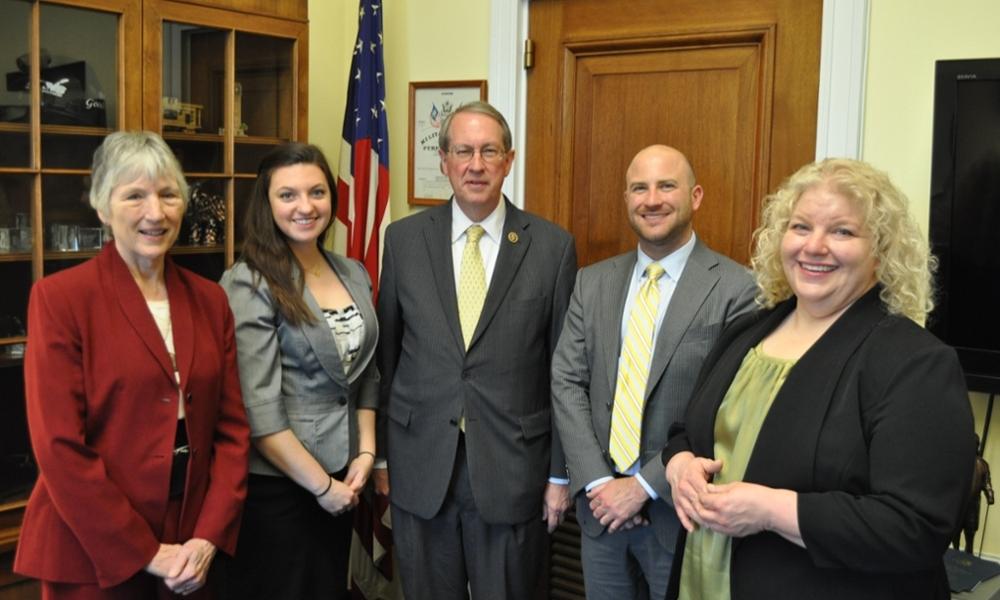JMU joins national effort advocating for science funding
News
SUMMARY: JMU participated in Congressional Visits Day, an annual event where scientists and students from across the country communicate the importance of federal support for research to lawmakers and congressional staff.
On April 28, scientists from all over the country gathered on Capitol Hill to meet with 60 different congressional offices as part of the Biological Ecological Sciences Coalition (BESC) Congressional Visits Day. The annual event is organized by the Ecological Society of America (ESA) and the American Institute of Biological Sciences (AIBS) to advocate for continued federal support of agencies that fund scientific research. JMU’s Office of Research and Scholarship coordinated participation for Integrated Science and Technology Professor Dr. Louise Temple, junior Biotechnology student Rachel Korba, and Director of Research Development and Promotion Ben Delp. The JMU representatives were joined by Amber Parker, Executive Director of the Chincoteague Bay Field Station, and Elizabeth Goldbaum, Senior Policy Fellow with the Geological Society of America. The five-person team met with the offices of Virginia Representatives Barbara Comstock, Bob Goodlatte, Scott Rigell, Rob Wittman, Don Beyer, and Senator Tim Kaine. Throughout the visits, Korba and Dr. Temple shared their personal experiences to show how federal investment has enabled them to conduct their research.
Korba’s research with Dr. Temple focuses on a turkey vaccine designed to help protect the birds from two bacterial pathogens: Bordetalla avium, which causes a sickness in turkeys that is similar to the whooping cough in humans, and Campylobacter, a bacteria that does not harm the turkeys, but causes food poisoning in humans who eat infected meat. “Campylobacter doesn’t visibly affect the turkeys, so it’s really hard for the people in the poultry industry to know if their animals are infected. Fun fact: Campylobacter causes more cases of food poisoning than salmonella per year,” Korba explained.
Korba first began working with Dr. Temple during her freshman year through a class called Viral Discovery. The class, which offers students hands-on, individualized wet lab experience, is open to all majors and doesn’t require a science background. Students collect soil samples and go through the process of isolating a kind of virus known as a bacteriophage. “They stick you in the lab right off the bat,” said Korba. “And there’s no prescribed “right answer” because you all have different soil from different places—so it really is organic lab research in a class setting, which is really cool.”
Korba and Dr. Temple’s research is funded in part through the NIH and the USDA, and would not be possible without federal grants. When Dr. Temple learned of the BESC event, she knew it was an opportunity worth pursuing. “I get the emails like everybody else does. And this is going to sound really grandiose but, I decided a while ago to only do those things that I think will matter a lot—or have potential to matter a lot. This looked like an opportunity to make a difference. And it was,” said Dr. Temple.
Participation in the event has historically been limited to Ph.D. scientists and graduate students, but Dr. Temple reached out to Ben Delp, Director of Research Development and Promotion, who was able to gain permission for Korba to attend the event. “JMU has a strong tradition of supporting undergraduate student research, and I was quite pleased that the organizers were open to including Rachel as part of the team,” said Delp. “My understanding is that she was the first undergraduate student to participate in the 12-year history of the event, and she did a wonderful job communicating her research experiences to congressional staff.”
“Honestly, I think the most important part of the visit was having Rachel there and having Rachel talk about her experience,” continued Dr. Temple. “I could have gone alone and the staffers might have taken me seriously, but to have a student talk about her experience and how funding and doing research has helped her—that’s what really makes the difference.”
Korba says the experience has changed how she views the role of Congress in supporting scientific research. She knows that her lab research will set her apart from other undergraduates when she applies for graduate programs, but she’s also excited to see how this experience on Capitol Hill will play into her future career plans.
“I think this was actually one of the coolest things I’ve done at JMU so far. It made me realize how important it is that scientists keep talking to congressmen and women because they’re the ones who are deciding on the budgets for all the science foundations,” Korba explained. “I really hope that something can come out of this in terms of my ability to communicate with the federal government, which is something I never thought I would ever be able to do. I would love to see this experience expand into more opportunities for me to present my research and to represent the university and the biotechnology program—just putting us out there and letting the world know what we’re doing.”
